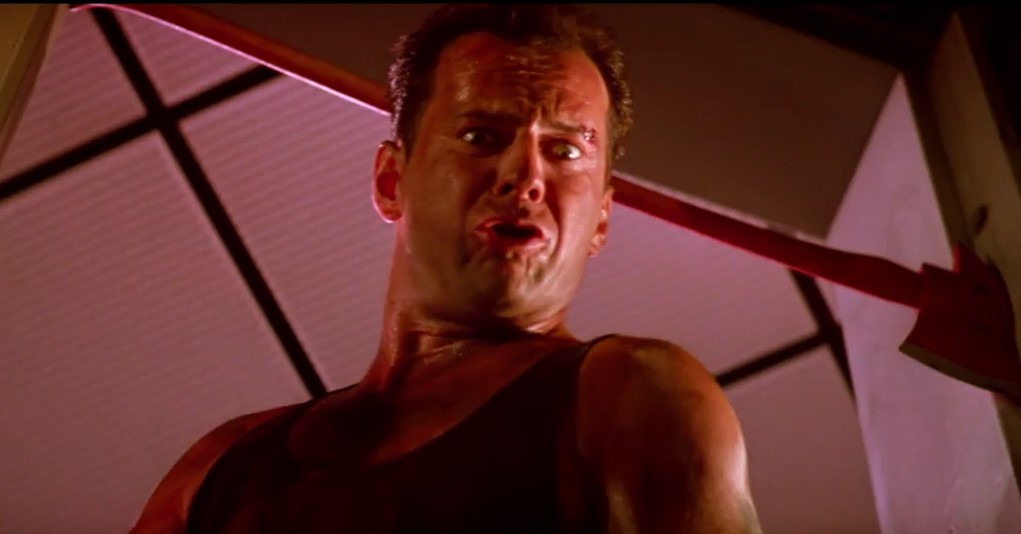Die Hard (1988)

“Die Hard,” directed by John McTiernan and released in 1988, is often hailed as one of the quintessential action films of the late 20th century. Its impact on the genre, along with its innovative narrative and compelling character dynamics, has solidified its place in cinematic history. The film not only set a new standard for action movies but also introduced audiences to a fresh archetype of the hero. This essay delves into the various aspects that make “Die Hard” a standout film, examining its narrative structure, character development, thematic elements, and enduring legacy.
At the heart of “Die Hard” is a taut, suspenseful narrative that unfolds in real-time. The story centers around John McClane, a New York City police officer portrayed by Bruce Willis, who finds himself in the wrong place at the wrong time. While visiting his estranged wife Holly Gennaro (played by Bonnie Bedelia) at her company’s Christmas party in the Nakatomi Plaza in Los Angeles, McClane becomes embroiled in a terrorist takeover orchestrated by Hans Gruber (played by Alan Rickman). The plot is a masterclass in simplicity and efficiency: a single location, a limited timeframe, and a relentless series of obstacles for the protagonist.
The real-time structure of the film creates a palpable sense of urgency and tension. The confined setting of the Nakatomi Plaza not only heightens the stakes but also allows for a more intimate exploration of the characters’ dynamics. McClane’s battle against the terrorists is not merely a physical struggle but also a psychological one, as he contends with his own vulnerabilities and the looming threat to his family.

John McClane is a departure from the traditional action hero. Unlike the invincible figures of earlier action films, McClane is depicted as an everyman—flawed, vulnerable, and relatable. His motivations are deeply personal; he is driven by a desire to reconcile with his wife and protect innocent lives. Bruce Willis’s portrayal of McClane is marked by a blend of humor and grit, providing the character with a distinctive voice that sets him apart from his peers.
Alan Rickman’s portrayal of Hans Gruber is equally memorable. Gruber is a sophisticated antagonist whose charm and intelligence make him a formidable opponent. Rickman’s nuanced performance injects a sense of gravitas and menace into the character, elevating him beyond the typical villain archetype. The chemistry between Willis and Rickman is a cornerstone of the film’s success, as their confrontations are both intellectually stimulating and action-packed.
Supporting characters, such as Al Powell (Reginald VelJohnson) and Holly Gennaro, contribute to the film’s emotional depth. Powell’s interactions with McClane provide a touch of humanity and camaraderie, while Holly’s presence adds a layer of personal stakes to the narrative. These characters help to balance the film’s high-octane action with moments of emotional resonance.

“Die Hard” explores themes of heroism, redemption, and the complexity of human relationships. McClane’s journey is as much about personal redemption as it is about defeating the terrorists. His struggle to reconnect with Holly and prove his worth serves as a powerful undercurrent to the action sequences. The film examines the idea that true heroism is not about being infallible but about persevering in the face of overwhelming odds and personal doubts.
The film also offers a critique of corporate greed and the superficiality of the holiday season. The Nakatomi Plaza’s Christmas party, set against the backdrop of the terrorist attack, underscores the disconnect between material wealth and genuine human connection. The juxtaposition of the festive setting with the violent events highlights the film’s exploration of surface appearances versus underlying truths.

“Die Hard” has left an indelible mark on the action genre, influencing countless films and shaping the archetype of the “reluctant hero.” Its blend of intense action, witty dialogue, and relatable characters set a new benchmark for action films and inspired a wave of imitators. The film’s success led to a series of sequels, each exploring new facets of McClane’s character and expanding the scope of his adventures.
The film’s cultural impact extends beyond cinema. The character of John McClane has become an icon, symbolizing the everyman hero who triumphs against impossible odds. The film’s influence is evident in the numerous “Die Hard” inspired movies and the enduring popularity of its catchphrases and memorable moments.
“Die Hard” is more than just an action film; it is a carefully crafted narrative that combines thrilling sequences with deep character exploration and thematic richness. Its success is a testament to the vision of its creators and the talent of its cast, particularly Bruce Willis and Alan Rickman. The film’s legacy endures because it redefined the action genre, offering a complex and relatable hero in a high-stakes scenario. As a cultural touchstone, “Die Hard” continues to resonate with audiences, proving that even in the midst of explosive action, there is room for profound human connection and personal growth.








